Before we brought our baby home almost two years ago, I thought I had my life pace figured out.
I was in the process of re-defining parenthood as mother without children in her home, but a mother nonetheless. I founded Our Courageous Kids to help me (and others) empower children around the world.
My writing felt like it was in the flow.
My best creative hours of the day were from 3-7 pm (weird, I know). I used the mornings for appointments, errands, and phone calls. The afternoons opened up rich space for me to get lost in the writing zone.

Trusted friends way ahead of me in the mom journey had warned me ahead of time, "Getting married is easy. Having a child changes everything."
I heeded their words. Thanks to infertility I had a long time to imagine what I might become. And then when 1st day of motherhood came, I expected to be magically transported into another mystical planet where I'd meet: "Elizabeth, the mom."
Because, that's what happens right?
Sure, I didn't sleep as much or eat out like I used to or leave the house without a plan first. (No more traveling on a whim!)
Yet, I still wanted to be creative. I still wanted to type out long first drafts of stories I hoped someone would read. I still wanted to soulfully abide in a community of thoughtful people even though I was now "Elizabeth, the mom."
But, how? How could I do both well especially as I took on a part-time pastorate last year too?
For when it came to my personal projects . . .
No longer could I count on my 3-7 pm hours as writing time-- for any parent can tell you that this is the heart of the child care zone of dinner, bath and bedtime.
No longer could I organize as I felt the creative wind-- for the working mom life is all about "I have this block of time to get this done before my child care is over" and then you're done. NO second chances.
No longer could I dance with words as my vocation for the day-- for my first attention went to church work and suppertime.
All I know is this: in the past year especially, there have been pockets of grace where my schedule suddenly clears I know it's God saying, "Just write." And I try to pay attention.
Or a guest speaker comes to church, and I use my regularly scheduled sermon time on Friday afternoon for creative prose.
Or there is that blog post that I must write even when I don't have the time to write it.
And then there are gifts like the week I'm currently experiencing as I'm a resident at The Collegeville Institute for the next 9 days in this beautiful place. The teacher has given us every morning to just write, write, write. Oh, Minnesota summer I am savoring you (and time to write this post!)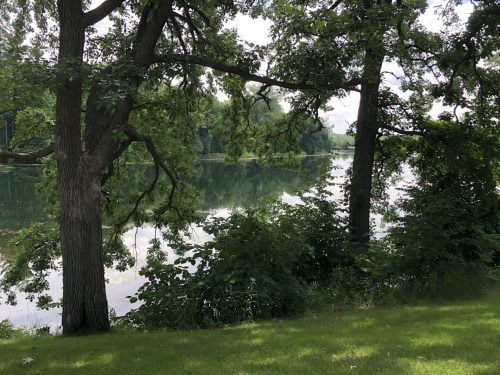
In my case, parenthood changed me of course. I know all the words to Goodnight Moon and all the most annoying Elmo jokes for starters. And I love another person more than I thought was possible.
But as Mary Oliver says, I still have my "place in the family of things."
My place finds me as I write.
For all of us whose lives are firmly planned in the church, there's one week of the year that exhausts us more than any other. And it's this one. Holy Week.
Extra services to plan.
Extra crowds to usher.
Extra bulletins to print.
Or church administrators talk about "getting through."
And when it's all said and done, the Sunday after Easter is one of the lowest attended services all year with the excuse "We're all too tired to come back." (And we really are).
Sometimes it's hard to think the "extra" is worth it.
I heard a clergy friend recently say, "I worked so hard on my Maundy Thursday sermon last year and only 10 people came. What's the point?"
I sat in a church council meeting a couple of years back when the leadership debated whether or not to have both a Maundy Thursday and/or a Good Friday service. The consensus was, "Oh that's too much to ask folks to come to! We possibly couldn't do both!'
I heard a member of a worship committee once offer about first time guests on Easter: "If the people really cared about church and God, they'll come back another week on their own. We don't need to do anything special for them!'
These encounters are full of frustration, annoyance and even anger, aren't they?
These leaders didn't want to give any more to Holy Week than necessary! If their efforts in previous years weren't acknowledged, appreciated or supported (or resulted soaring attendance numbers the next month), then why bother?
But to all of this my church loving friends, put your best foot forward. 
It's our week to show up.
The story of a triumph, the clash of money and power, service, betrayal, denial, death and new life is our faith!
Where would our narrative be without the Upper Room, the cross, the tomb and the resurrection?
How would we have anything to say the other 51 other Sundays without the message of Easter? The themes of Holy Week are what we believe!
So why not go for the gold this week and show up every time your church doors open? Why not plan and offer the best possible worship experiences we can muster up?
Really, why not?
I know it can be exhausting.
I know it might be thankless.
I know you might want to crawl into your cave on Sunday afternoon and not come out for awhile when it's over.
Preach your best sermons.
Show up on Thursday night, sunrise and Easter am too!
Love on your visitors.
Claim it. Name it. Own it.
Put your best foot forward, church. If you don't who will?
And P.S. If you live in the Washington DC area and don't have anywhere to go in particular this Holy Week, join me for services at Palisades Community Church. Learn more here.
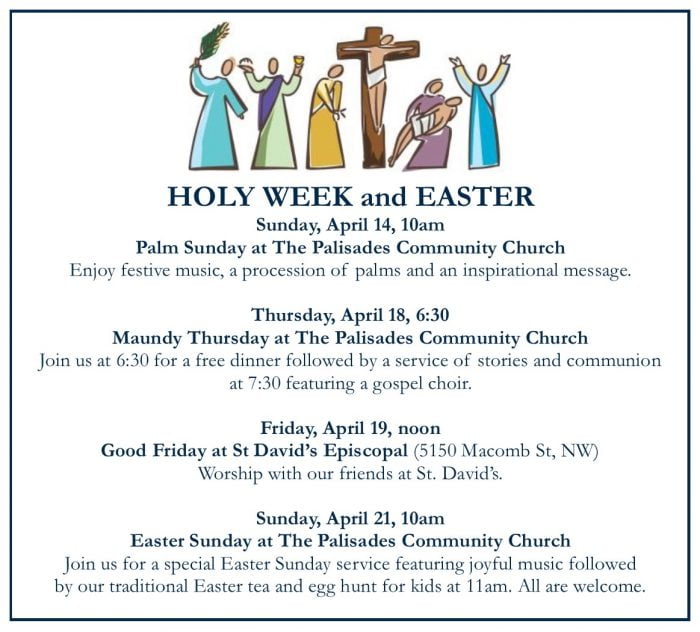
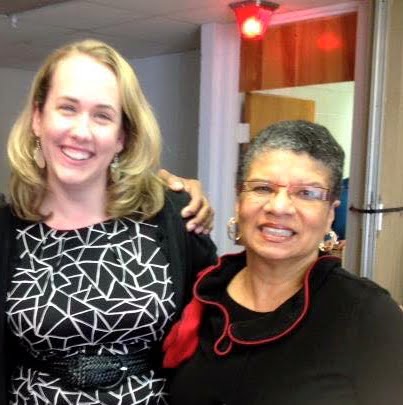 For this season of life, I am not the pastor of a particular church.
For this season of life, I am not the pastor of a particular church.
I'm staying busy as a Preacher on the Plaza, traveling with Kevin as part of his work, writing a lot, and short-term projects/ supply preaching in churches. I would love the opportunity for another church post but I also know there's a season for everything.
So then, then what about Sundays right now? What do we do? Where do we go when I don't have a gig?
Seems simple enough, right? Just go to church . . .
But being a Rev in the pews is no easy thing. You don't just go to any church.
Here's a secret for you: pastor types can be a real pain in the ass.
We have opinions about music choices. We have opinions about service structure. We have opinions about how the prayer time is handled. Opinions about everything really
It can be hard for us to just go to church (especially if we want to be leading).
I can also be hard for pastors to receive other pastors (for someone with so much expertise in the pews can be so intimidating!)
But, pastors need other pastors. Pastors need church. Pastors need to hear soul-stirring sermons that they don't preach. We can't let our critiques keep us from a spiritual home.
To all of this, I declare that every pastor needs a Jeanie in their life.
Or more technically, a Rev. Dr. Jean Robinson-Casey. Her friends call her Jeanie and she's my pastor.
I love her and her amazing husband, Clyde (a Rev. as well) for many reasons. But here's one: Jeanie has welcomed me lovingly into the community life of her congregation, Martin Luther King, Jr. Christian Church in Reston, VA.
I love the joy of the worshiping life of this community and their growing concern for acts of social justice and racial reconciliation in the larger community. I love that we get our hug quota and then some during the greeting portion of the service. And I always feel like they miss us if we've been gone awhile.
But most of all, when I attend, there's no weirdness that I'm a pastor. I seek to respect the boundaries of course, what I am and am not, but regardless there's space for me to be me.
I don't cease to be Rev. Hagan when I am there. I'm asked to preach from time to time. I pray publicly and anoint the sick when asked. I even led the efforts to re-design the church website last year.
Instead of all of this, I could easily go to a congregation where I sit silently on the back pew and do nothing other than come in and leave as fast as I arrive. And tell Kevin what was wrong with the sermon on the way home. . .
But when the time came to join a church in 2013 in our area, I knew there was no other place for us than MLK Christian.
And so much of this decision had to do with Rev. Jeanie.
Under her leadership, I feel like I belong. I'm challenged to serve as I watch and pray for what comes next. And I know if my life faces a major crisis people from this church will show up for us.
This is exactly what church should be . . . even for pastors. Actually especially for pastors.
Thank you, Rev. Jeanie for being my pastor! I'm one of your biggest fans.
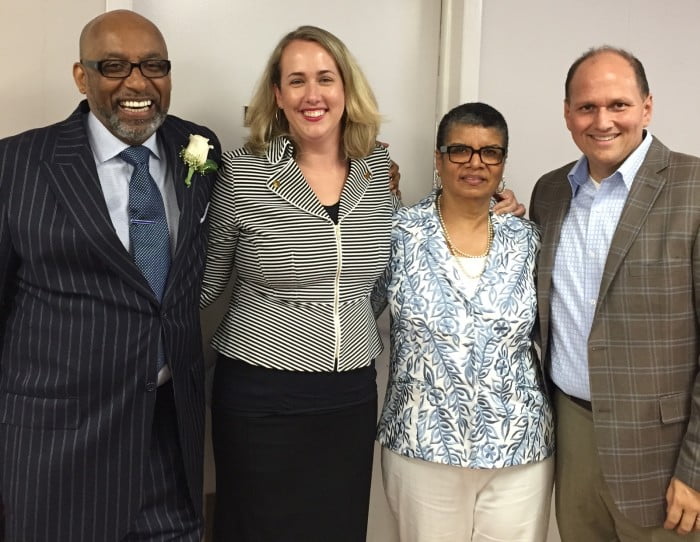
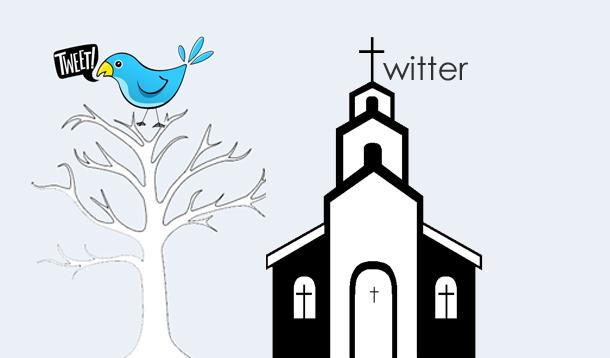 "You should really try Twitter, Elizabeth. It's a good networking tool for the church."
"You should really try Twitter, Elizabeth. It's a good networking tool for the church."
Such were the words from a communications professional friend. In 2008, they fell on my deaf ears.
My distant impression of twitter was a bunch of people saying: "I had a peanut butter sandwich for lunch."
Who really cared? I just didn't see the usefulness in that.
And, furthermore, why did I want to keep up with one more thing in my already over-media-stimulated life ?
I didn't have time.
But, never wanting to be a person behind on something new, I finally gave in to my friend's suggestions, and after a short tutorial from him, I was up and tweeting for the first time in the spring of 2009.
And since then, my love of twitter for ministry has grown and grown. I LOVE Twitter.
This is why-
Through Twitter, I've become friends with new colleagues that I still haven't met face-to-face but now count as great encouragers in ministry.
I've recruited new church members who found me on this site (yes, it really happened) and who later began attending weekly worship regularly.
And a bridge has emerged through Twitter to share my sermons with folks who might never attend a local congregation. Preacher on the Plaza went to Twitter-ville.
Most recently, I've been schooled in important social movements like #Ferguson #BlackLivesMatter #MoralMonday from those on the ground doing really important work!
Different from Facebook which you might be more familiar, Twitter allows you to share conversations without sharing any more information that you are comfortable with.
In choosing to "follow" particular individuals or groups, you gain access to their updates, but they don't necessarily see yours unless they "follow" you as well. (You can even make your profile private if you want to).
The key to Twitter is that you only have 140 characters per post. If you go over this limit, your thoughts are prohibited from being shared. Over time I learned:
If you want more followers, it is good to follow others.
If you want others to keep following you, it is good to tweet more often than once a month.
It is also wise to follow only people in whom you have an interest; for if you don't, your home page will easily fill up with unhelpful spam. And who likes spam?
As I've tweeted now for 6 years and taught others to do the same, I've often thought about the parallels to the church. The "rules" of twitter might have a lot to offer us in the church.
Not only should we tweet, but we should take our cues from our culture's love of tweeting. 
First, say what we need to say and stop.
The days of long typed newsletters addressed with a stamp on a letter in the mail are over. If we want to make connections to potential church members, we have to speak concisely and speak online. We must grab their attention and let them come to you. More words does not equal better.
Second, if we want to reach more people with our churches, then we must "follow" people outside our normal social circles.
It's so easy to connect with those in whom we have natural affinity: moms at our children's schools, other retirees on the golf course, or our neighbors next doors. But if we don't get out of our comfort zones, then we could miss out on amazing possibilities of relationships with people who would benefit from knowing us and us them!
Third, it's a necessity to stay connected to those on our membership roles.
Relationships, like Twitter followers, take time and effort to keep going.
Like Twitter, just because someone joined the church several years ago, doesn't mean that finish line has been reached; it has only just begun!
It is easy for folks to feel "de-followed" by our church when our fellow church members miss important life events like births, deaths, or deaths, without some sort of contact. Communities must communicate together.
After all, the church, like any good means of technology is never something to be mastered all at once. Rather church is something we grow into as it's learned and practiced together.
So, might you consider giving Twitter a try? Find me @elizabethhagan and let's talk!
Or if not, at least consider take your cues, oh church loving friends, from this amazing social media tool.
A sermon preached at the Martin Luther King, Jr. Christian Church, Reston, VA
on the occasion of Rev. Dr. Jean Robinson-Casey's anniversary as pastor 1 Samuel 15:34-16:13
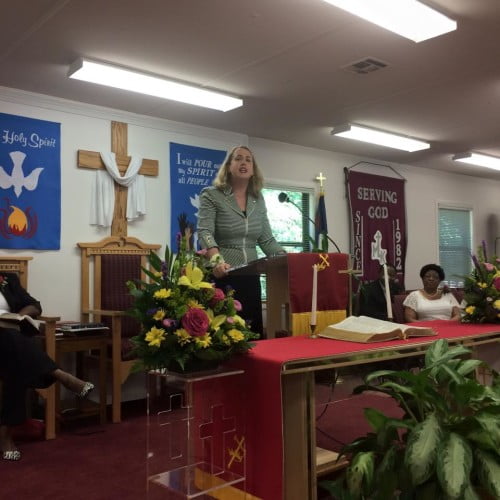 A kindergarten teacher gave her class a “show and tell” assignment. She said: bring something to school tomorrow that represents your religion.
A kindergarten teacher gave her class a “show and tell” assignment. She said: bring something to school tomorrow that represents your religion.
The first child got in front of the class and said, “My name is Benjamin and I am Jewish and this is the Star of David.”
The second child got in front of her class and said, “My name is Mary, I am Catholic and this is the Crucifix.”
The third child got up in front of his class and said, “My name is Tommy and I am Baptist and this is a casserole.”
And it’s true, when it comes to death, we know how to make a good casserole (and not just the Baptists).
We also know how to visit funeral homes and even write sympathy cards.
But, when days turn into weeks and weeks turn into months after someone’s beloved has passed what do we do?
Usually nothing.
But I believe our Jewish brothers and sisters have it going on when it comes to grief. Have you ever grieved alongside a Jewish family?
One of my favorite practices of a Jewish season of grief is called Shiva.
Shiva is the 7-day time period after the loved one dies when the family and friends gather on a nightly basis at home usually with the Rabbi to say prayers and remember the life of their beloved. Night after night after night. For seven whole days (and sometimes beyond).
During the Shiva period, mourners also do not participate in parties, concerts, TV, movies, or similar events that are celebratory in nature. Those who visit the house in mourning pay their respects by sitting on low stools or even on the floor. Mirrors are covered throughout the house. And often the mourner wears a torn black ribbon on their clothes as a sign that the loss of the loved one has torn a piece of their hearts. Candles are burned.
Then at exactly a year after the passing of the loved one another special ceremony is held to mark the end of the life again. In my opinion, these are some beautiful rituals!
But no matter how long we grieve or don’t grieve for the losses in our life, if we’re Christian, Jewish or Muslim, there’s always an expectation of an expiration date for grief no matter the culture. Isn’t there?
But often our grief has a life cycle of its own.
I don’t want to be the pastor this morning that tells you not to grieve, not to pour out your heart to God when the situation asks for it.
I don’t want to be the pastor who tells you to have any shame when life hits you with an unbearable loss.
I don’t want to be the pastor who says don’t cry if you need to, even in public (which I have to tell you my husband, Kevin hates when I cry in public because he always says people are then looking at him, thinking that it’s his fault when it’s not).
No, this morning, I don’t want to be anti-grief at all.
But I am going to ask you this morning this one question, “How long will you grieve?”
How long?
This morning, in our Old Testament lesson, we encounter two powerful leaders transitioning toward how the promptings of God’s leadings. And one was asked the question, “How long will you grieve?”
One man was priest in chief in all the land. The other man was the king. The king is told by the priest that he would soon no longer be king. The king doesn’t like this news (of course). And the priest doesn’t like giving it. But this does not change the facts.
Grief enters the picture.
But the Lord says the priest struggling with the change, “How long will you grieve?”
How long?
Let’s talk more about WHO these two men are.
First, there’s Samuel, the priest. He’s an honorable man before God whose calling came even before he was born!
His mother Hannah prayed so hard for him that when onlookers saw her in the temple crying out to God they assumed she was drunk. But thanks to Hannah’s prayers and the Lord’s hand on his life, Samuel listened rightly from a young age.
Remember his famous call story? Samuel lives in the temple of the Lord alongside the high priest at the time, Eli.
One night Samuel hears the voice of something calling. It comes not once, not twice but three times. And Eli tells him when he heard the third time to say, “Speak, Lord for your servant is listening.”
And from this point on, as Samuel began to play a major role in the spiritual life of the nation of Israel: he was God’s mouthpiece.
As the people cried out to be a nation “like everyone else” and not be ruled by judges but by kings, it was Samuel’s role to anoint the first king of the land.
This brings us to our second character of the day, Saul. Scripture tells us that he’s good looking and a head taller than everyone else. And of course being tall and handsome makes for a great leader, right?
But, Saul was from the tribe of Benjamin, the smallest and least important tribe of the nation—so still unlikely choice when picking kings if it came down to a popularity contest. But back in chapter 9 of the book of I Samuel, we learn, though, that Saul is God’s man. At age 30, he descends the throne. The very first king in all of Israel!
And Saul’s a good king until . . . he stops listening to the One who put him on the throne. He becomes more afraid of what the people say about him rather than God. He can no longer be trusted to do as God asks him to do. According to God, Saul must go. Samuel needs to break the news to him.
Can you imagine what this meeting of “You’re fired!” felt like, especially for Samuel?
For, Samuel had invested so much of himself in Saul.
Samuel was Saul’s go to advisor, teacher and trainer.
Samuel had laid aside his ego so that Saul could do his thing and shine.
And now it seemed like all of this hard work was for nothing! A dream cut short.
If we go back a couple of verses, we learn that when Samuel first hears this news from the Lord, he “was troubled and called out to the Lord all that night.”
If that is not a picture of grief, I don’t know what is! For we see Samuel:
Crying out.
Not sleeping.
Counting the minutes on the clock till morning.
(And we’ve all been there too).
But as time passes, the Lord comes to Samuel again and says: “How long will you grieve?”
How long?
I want to stop right here and check in with what I think some of you might be wondering about your preacher this morning:
“Don’t I know what Sunday this is? Don’t I know what occasion I came for? Did I get confused? Don’t I know that a Pastor’s anniversary service is supposed to be about celebration, not all this depressing talk about grief?”
Yes, I know. And I know that you love your dear Pastor Jean and Clyde. And I love them too. And I’m so glad you set this day aside every year to celebrate their ministry among you.
It’s a word that asks us about all the places in our lives where we are stuck.
It’s a word that asks us where we’ve been paralyzed by the vision that we have for our lives that's not working out.
It’s a word that moves us to action: to lay down the losses that we can’t just seem to get over SO that God’s fresh new wind can blow it’s way through us again.
I don’t know about you, but if I were to make a list of the grief like this, the list would be long.
All of this is leads to grief my friend. Real grief.
And as a church family we’ve got our grief lists too.
And to this, the Lord says, “How long will you grief?”
How long?
I guess, church, we all have a choice.
The Lord says to us, fine. Have your grief if you want it. Have your sleepless nights if you want it. Have your vision of your life if you want it.
But if you are ready for something better, then grieve no more. Let what is dead be dead.
The morning has broken. A new day is here. Open your eyes to see it.
Consider what happened next with our guy, Samuel. As we go back to I Samuel 16 new possibilities come into Samuel’s view.
 From God, Samuel receives specific instructions on how to proceed. He’s told to go to Bethlehem. He’s told find the sons of Jesse. He’s told that when he reaches the village, he’ll know which one of the young men will be the next leader.
From God, Samuel receives specific instructions on how to proceed. He’s told to go to Bethlehem. He’s told find the sons of Jesse. He’s told that when he reaches the village, he’ll know which one of the young men will be the next leader.
Samuel is confused (as we often are) but he’s attentive to the voice of the Spirit. He listens! And the most unexpected leader emerges.
David, who is young, small and most certainly NOT ready for a gig on the national stage is presented last.
Samuel hears this: “The Lord does not look at the things man looks at. Man looks at the outward appearance but the Lord looks at the heart.”
Get your head out of the rear view mirror and look up ahead. See I am doing a new thing, do you not see it?
How long will you grieve, Samuel?
How long?
I once heard a story from one of my colleagues about a young couple that attended his congregation.
This couple, I learned from my pastor friend were so in love when he married them, so compatible, so full of great plans for their future of children, vacations and the young wife even wrote a plan for how they’d celebrate the best holiday traditions while they were still engaged.
But, then 2 months into their fairytale like marriage the husband was driving home from work and was instantly killed one evening by a tracker trailer.
You look up the word “unfair” in the dictionary and there should be a reference to the newspaper story about this day. Car accidents should never happen. And the most certainly should not happen to bright 20 somethings.
My pastor friend went on to tell me more about this widow. How she began a daily ritual a couple of days after the funeral.
Every morning, she’d go to graveside, take her coffee and read aloud from one of her devotional books or other literature she liked.
When anyone asked why she did this, the widow would always answer, “Because it’s how I feel close to him.”
We want to say awww don’t we? It’s a beautiful expression of the timeless bonds of love, isn’t it?
But then when I asked my pastor friend what I thought was a basic question, “How long ago since this husband died?” the pastor said to me, “The wreck was 23 years ago!"
I gasped. The pastor went on: "Though she gets regular invitations to re-imagine her life with new friends, new activities and even new romantic partners, this woman will not stop grieving. She won’t stop going to the grave every morning.”
We’ve also gotten stuck on what we hoped our family would be! We too have gotten stuck on what we wished our career could be! We’ve gotten stuck on what somebody else said our church should be by now!
And in our grief, we’ve forgotten the resurrection power of our Lord. We’ve forgotten to dream a dream and live into something new, the new that our all-knowing Lord has prepared for us all along.
So church, do you want to move into the new?
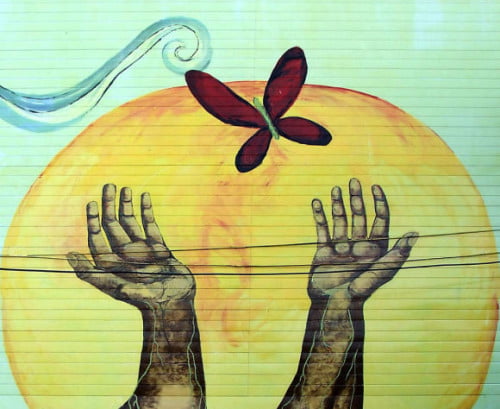 I can’t think of any better way on this anniversary of your pastors, than to commit to yourself this morning to grieve no more on what the Martin Luther King, Jr. Christian Church is not.
I can’t think of any better way on this anniversary of your pastors, than to commit to yourself this morning to grieve no more on what the Martin Luther King, Jr. Christian Church is not.
I can’t think of any better way to live into where Pastor Jean and Clyde are leading you in the future than to lay aside the losses of the past.
I can’t think of any better way to be good stewards of the ministry that God has given you in this place than to mark this day, to mark this day as the day when you grieved no more.
To claim this is a day when you said to Jesus, “I am going to trust you.”
“I am going to follow you.”
“I am going to step out on faith with you . . . even if what I really want to do is run for the covers at in bed at home.”
And most of all: “I am going to grieve for the past no more. I am going to say yes, Lord. Yes, Lord to what you have for me.”
So, church, how long will you grieve?
Let's leave the tombs and follow our resurrected Lord.
AMEN
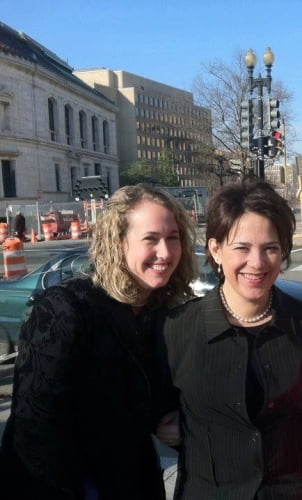 If you missed this week's first saint story, click here.
If you missed this week's first saint story, click here.
Continuing with the series today, I want to introduce you to my friend Amy-- a living colleague who has walked the journey with me for almost 10 years.
It's hard to describe my journey in ministry without talking about her presence in my life.
Many of you know her now because she's the pastor with her name in lights-- blazing new trails as the first female senior minister at The Riverside Church in New York City.
But in 2004, from a library computer at Duke Divinity School in between my classes, I wrote Amy a blind email asking if she'd be interested in having a pastoral intern for the summer of 2005 at Calvary Baptist Church in Washington DC .
To surprise of us both, she said come on!
As the summer of 2005 began, I hoped that Amy would like me. I hoped she’d give me meaningful things to do.
Yet, from the first week, I realized that a redemptive experience was underway that went way beyond these some sort of "Do you like me? Check yes or no" jitters on the first day.
Amy was and is a different kind of pastor. And she was inviting me into her sisterhood.
Amy took me quite seriously. She gave me great projects to work on such as organizing the first booth at Capital Pride on my first day! But not only did I get thrown in the deep end work wise throughout the summer (which was wonderful), I became a part of her life.
I spent time with her family. I found a safe space to share my frustrations and joys of the past and present about the crazy profession I wanted more than anything. I listened to her laments and exciting moments as well. She invited me into her process of what it meant to a young pastor.
Even as Amy juggled the demands of family, three kids, and time for herself, I never felt like she didn’t have time for me, as had been the case with other pastors I knew.
I saw someone thrive who intensely pursues interpersonal relationships in the pastorate, and I recognized the goodness of this strange gift of mine once again.
As I heard Amy speak daily about the church as a community of faith, living and struggling together, my similar vision of church was deepened and affirmed as well (this community stuff actually works!).
And most of all I was encouraged by Amy’s “make your dreams come true” pursuit of life.
From that summer on, I believed that barriers such as conservative upbringings or discouraging denominations can not keep the call of God from springing forth in women like me. God has created and called me with exactly what I need to minister to the local church.
From the internship I became her colleague, and then a friend. More than a year later, Amy spoke at my ordination (which I'm celebrating my 8th anniversary today!). A year after that Kevin and I chose her to perform our wedding. And two years after that, Amy was one of the speakers at my installation when I became a senior pastor a couple of miles down the DC beltway.
Now, I'm thankful Hagan household has many reasons to visit New York because of Feed the Children's presence there, so we can continue to be a part of her life and ministry.
I thank God for living saints of the church like Amy-- not just for all she's accomplished along the way (which is a lot!) but for the gift of friendship that she so richly shares with those on her path.
Thanks for answering my email back then and all the email since . . .
On Monday, November 4th, I celebrated the 7th anniversary of my ordination.
Seven years ago this week, I stood at the front of a church-- Calvary Baptist Church in Washington DC and said to the congregation gathered of family, friends and congregation members that I would serve God in my vocational pursuits. I said I would set aside personal interests for the sake of the community of Christ. I said I would seek to embody, teach and share the gospel with my life. I said I would do all of this for as long as I lived.
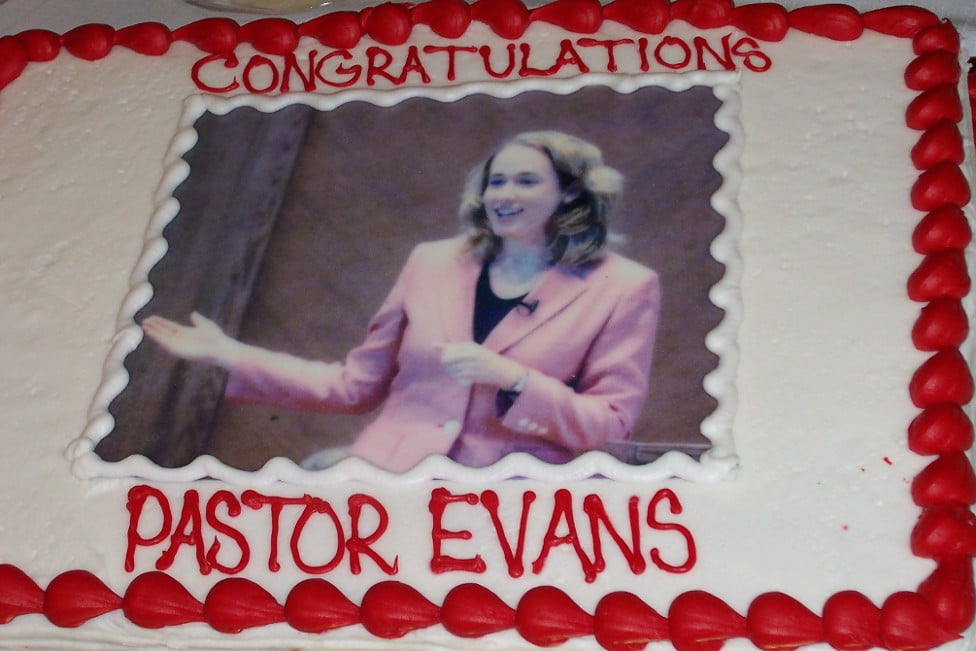 After the service, we gathered in the church social hall and ate sausage balls and cheese dip among my other favorite snacks made by my future mother-in-law. There was a cake with a picture of me preaching with a huge, "Congratulations, Pastor Evans!" on it.
After the service, we gathered in the church social hall and ate sausage balls and cheese dip among my other favorite snacks made by my future mother-in-law. There was a cake with a picture of me preaching with a huge, "Congratulations, Pastor Evans!" on it.
A big day all around.
The night before the service, I sat upright the in bed lounging with my closest girlfriends who came into town for the celebration (Baptist ordained pastors as well) trying not to be so anxious.
Over a bag of chips on top of the brand new white comforter I finally had the money to buy in my first post-seminary job, I recounted to them my deepest fear about the hours to come.
It wasn't about the music going awry.
It wasn't about the having to kneel for so long at the front of the church without my legs falling asleep as people prayed prayers of blessing over me.
It wasn't whether or not I'd be able to pray the benediction as I'd planned to say without being too emotional.
No, it was a cry of: "I don't want my life to be over."
I was having pre-ordination jitters; the kind where I really knew that this moment in my life was a really big deal.
And even as my pastoral support girlfriend team sought to calm me down saying that my life wasn't really over. They said things like, "You'll still have fun. . . We'll make sure of that. Being ordained doesn't make you any less human." There was part of me that felt the weight of the shift.
It was like I was getting married to God. I had one last night of freedom.
I ate more chips.
And though I had done everything I could to finally make it to this day-- the improbable feet as a Baptist woman in ministry getting a Reverend in front of her name-- when I stood in front of the altar on November 4, 2006, the relationship of God and I being in an more intense partnership was never exactly what I envisioned it to be.
This would be no easy marriage.
Though I'd grown up with a pastor for a father and knew all the social expectations that came with the title, to be the Rev myself was entirely new. Because all of the sudden the expectations didn't just come with my family name but it was what I'd chosen.
I'd chosen to be the one who would be asked to publicly pray more than the norm.
I'd chosen to be the one who would be asked to stand the gravesides of the grieving, the bedsides of the sick and on the doorsteps of the bewildered seekers.
I'd chosen to be "on call" 24-7 when pastoral emergencies arose in a congregation.
I'd chosen that when the day came that I was legally married to a man that he'd be the kind of man that also supported the marriage I'd been pursuing long before we'd ever met.
But as is with most marriages, as it was with my ordination, it was not a one-sided deal.
God long before had chosen me.
Not that I was more special or "called" than others with different kinds of work, but that this was my path to walk with God.
And in many ways my "fear" was indeed right on-- my life as it was before 11/4/06 was over.
In this new relationship that God and I would share together, greater discipline and sensitivity to the Spirit would be required.
No longer could I ever assume that my faith was for my own edification alone, but was for the blessing of my community.
No longer could I act as though I didn't need community, for as much as they needed me, I needed them.
No long could I live in such a way that forgot the day that God and I got married-- for if their ever came a time when I felt like a new vocational path was given to me-- I'd need to release this marriage in a public way just as it was given to me.
Being married is a long-term commitment.
Seven years ago it all began. Together God and I are still on this journey.
Stay tuned for part 2 of this series coming soon . . . Seven years later.
 I've been around church for years. And I think I've seen so much of what makes church, church these days--
I've been around church for years. And I think I've seen so much of what makes church, church these days--
Traditional Worship
Contemporary Worship
Contemplative Worship
Worship by the Common Book of Prayer
Worship where tongues are spoken
Worship where hands are raised
Worship in shorts
Worship in suits
Worship with shouts
Worship in silence
Worship from the pews
Worship from the pulpit
Is there a correct way to worship?
Is there a way of worship that is more pleasing to God?
Is there a worship style that will get more people to attend your church?
Such are the kind of questions church folks like to ask each other. Such are the kind of questions that church folks like to think they have complete certainty about.
We go to conferences to seek to worship in mass numbers. We go to conferences to learn better ways to lead our kind of worship. And we go to conferences to learn about the latest trends in worship.
But is such worth all our energy? What does God think of all our shuffling around like this? Does "better worship" or "bigger worship" really help us draw closer to the Divine?
I'm not so sure.
We've become good students at the art form of worship, but we've lost sight at what encountering God looks like-- the kind of God that Annie Dillard says we need to wear crash helmets to experience in church. We've lost sight of believing that worship begins with a relationship. Worship begins with a desire for adoration of the One who is greater than us all-- who could never to be controlled
And no fancy templates or worship orders are always needed. We can worship with or without drums, the piano or the organ.
And most of all, it's never about emotion alone as is the most popular trend in so many churches today-- it's about an alignment of our entire being.
And worship most of all is not about us-- not about what we "get out of it." Not about the feelings we leave a worship service with and most of all worship is not for worship's sake. Worship, as given to us in the Christian context is about setting our feet on holy ground. Holy ground which we may "feel" once in our lives-- or if we are lucky maybe more . . . but the emotion is never guaranteed.
Consider this wisdom from Roberta Bondi about the emotional traps of whatever kind of worship practice we choose:
“If we have a powerful religious experience, we need always to remember that just because a religious experience is powerful it is not necessarily from God."
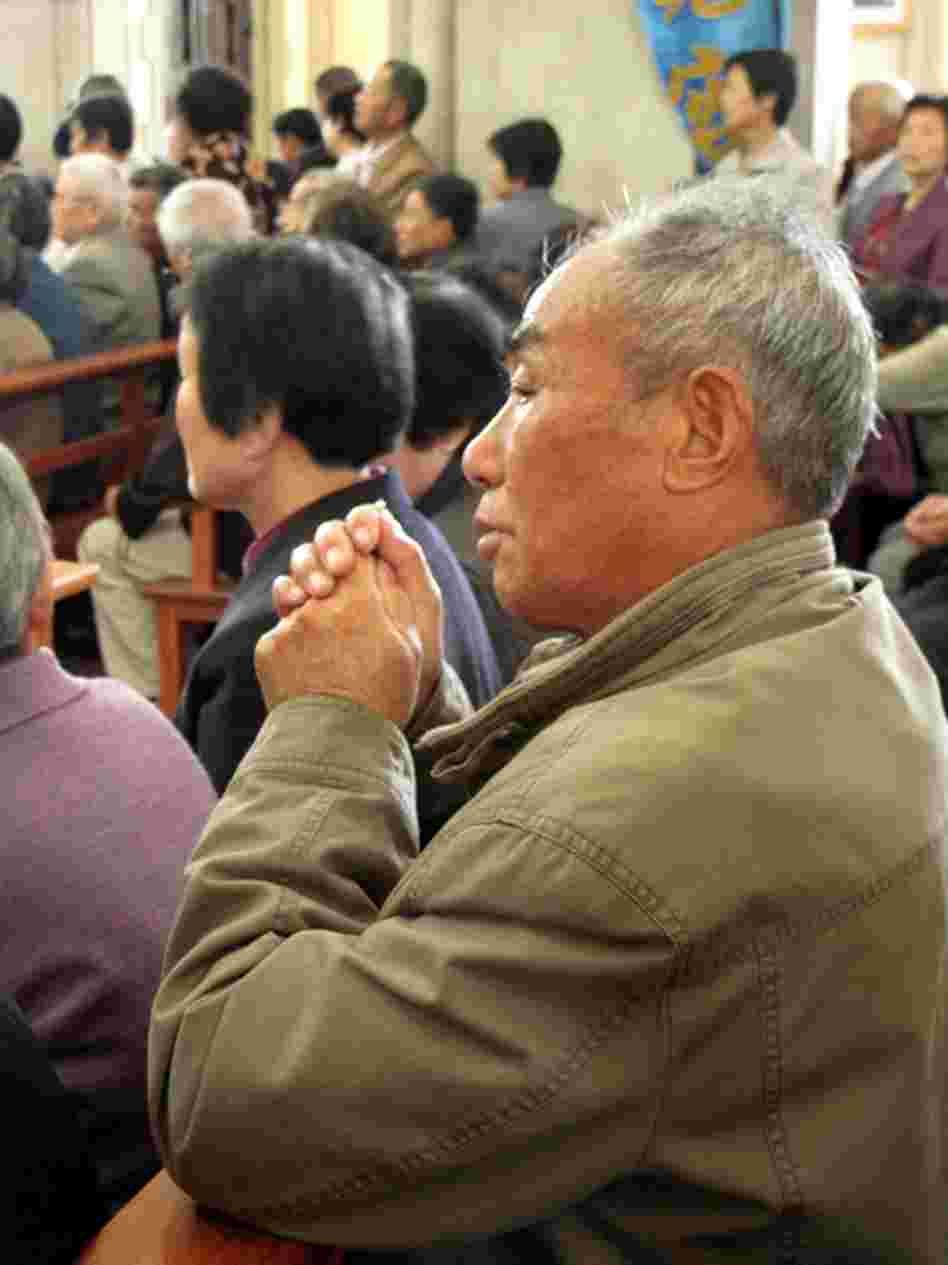 Bondi goes on to ask us to consider these questions in our discernment of worship: "Does this experience make us feel singled out and either superior or not accountable to others in or out of the community because of it? Does it lead us to be judgmental of others, to say who deserves to belong to God’s people and who does not? . . . OR does this experience give us insight into ourselves, others or God? Do its insights hold good over time, or was it simply an emotional high that not only wears off but makes us seek another?”
Bondi goes on to ask us to consider these questions in our discernment of worship: "Does this experience make us feel singled out and either superior or not accountable to others in or out of the community because of it? Does it lead us to be judgmental of others, to say who deserves to belong to God’s people and who does not? . . . OR does this experience give us insight into ourselves, others or God? Do its insights hold good over time, or was it simply an emotional high that not only wears off but makes us seek another?”
If an experience of God in church leads us to want more of the experiences (the high of it all) and not God alone, then it is not worship at its best. BUT, if an experience changes us from inside out, turning over in us bone and marrow, thought and feeling, then it is worship that is about to change the world. It's heaven come to earth.
What I most like to tell people as a pastor is: if you feel the need to raise your hands in a "quiet" church: do it. If you feel the need to cover your head in reverence in a "high" church: do it. If you feel the need to sit reflectively in a "loud" church: do it.
I think the sooner we stop trying to manufacture experiences of God, the sooner we'll find the Holy in whatever tradition our worshiping life takes us.
For all of you faithful blog readers out there, I wanted to take this Tuesday morning to say thank you for reading! It means so much to me that you'd share some of your precious time with me and my musings. And second, I want to let you know that if you enjoy reading here, I also write in several other places on a regular basis.
 It has been a gift over the past almost two years to write commentaries for the Associated Baptist Press and now also for the Associated Baptist Press blog.
It has been a gift over the past almost two years to write commentaries for the Associated Baptist Press and now also for the Associated Baptist Press blog.
I've recently published articles at each of these sources if you want to check them out. Since it's Pastor Appreciation Month, I thought I'd share along the lines of this theme in both places:
On the Main Site: "Re-thinking pastor appreciation."
On the blog: "Where pastors find support."
I've love to hear your feedback on this topic, both from clergy and non-clergy alike. What should we be doing to encourage our ministers? Or is this topic too over promoted and thus needs no more conversation at all?
Blessings to you all!
You are out of words.
People seek from you what you don't have anymore.
You plan retreat and they come and find you.
Pray for me, pastor.
Visit me, pastor.
Solve my problems, pastor.
What do you do?
With compassion, you keep going.
You get out of bed.
You bathe.
You get dressed.
You show up.
You keep trying.
"The peace of Christ be with you."
You search the far corners of your heart, hoping there is some gem there.
You hope your morsels are enough to feed the five thousand sitting at your doorstep.
And, you plan vacation again.
You count the days.
You look for light.
You run toward it.
And you hope when all is said and done that there will be a good story to tell.
A really good one.
A story of unbelievable grace.
A story that feeds the five thousand with your morsels that have become loaves of bread.
Tomorrow morning, I will be a part of a 65+ other Baptist pastors on a "Goodwill" delegation to the White House. Our group which includes such cool pastors as those from this church, and this church and this church among many others from all over the country. Together, we will meet with senior White House staffers to discuss issues we see facing the those we serve in our congregations and other ministries.
According to organizers, this is the agenda: "We will get to express concerns, ask questions, speak morally about the budget, taxation, immigration, health care, war, criminal justice, the environment and other issues. We will get to share what concerns us as congregational leaders, what's on our hearts as moral leaders, what community needs are pressing, what our churches do that works to advance the common good. We will also get to hear how administration officials see issues, how they explain their purposes and goals of policies."
So, on behalf of you, my blogosphere community, what would you want to ask the White House Staff if you could? I'll be happy to take your questions with me and report back. What fun it is to live in Washington, D.C.!
Any leader is only as good as their team mates and back-up support on call. This is what I know from being a pastor.
When I first came to Washington Plaza, as the pastor, with only two other part-time staff members to help carry the load, I had no pastoral back-up. (Not even a retired minister in the mix). I worried a lot when I was away for conferences or vacation about what might come up. (My plea to those ill: Please wait to die until my vacation is over).
Furthermore, to expect the pastor to be and always do all of the pastoral care, I knew was unhealthy and unbaptist (we love the priesthood of the believers after all).
So, I inquired of the church leadership why we did not have deacons. No one really could give me a good reason. My response became: "Why not?" (It all went back to the previous pastors' preferences, it seemed). Not only would deacons help me, but I knew it would be a blessing to the congregation. It would be a great opportunity for some very kind and spiritually aware members to live into their giftedness. A win-win!
So, in 2010, we engaged in a year-long study of the visions of what deacons would look like in the congregation-- the Washington Plaza Baptist way-- and came up with a plan. We'd follow the model of the early church and elect deacons to be spiritual leaders and servants among us. We'd call out those in our community who we felt had the gifts and interest in this kind of service through a nomination process. And, then we'd ordain each of them in a formal service of blessing their future ministry as pastoral care givers in our midst. To give the deacons the support they'd need for their 3 year term of service, we'd pledge to meet monthly as a deacon body to share joys and concerns of working alongside the families we'd been given to look after. And, no, the deacons, contrary to the standard in many Baptist churches, would not serve in an administrative capacity. We'd leave this to the Church Council.
November 2010 marked the first deacon ordination service in over two decades at Washington Plaza. It was a joyous day as you can tell from this previous post. It was one of those days as a pastor when I felt like God's spirit was especially cheering us on saying, "You are moving in the right direction as a congregation." Who says an ancient tradition can't be re-born in fruitful ways for the modern context?
This month, the official one year anniversary of our first deacon's meeting, we did some self-reflecting as a group. Though we've had a lot of learning to do over the year, I've been so proud of the ministry I've watched our deacons provide in their service to the church.
One of our current co-chairs wrote this piece to share with the congregation more about what the deacons have been up to in the last year. I thought I'd share it here so you could hear more of this co-labor of love.
Dear Church Family:
It been a little over a year since the deaconate
was re-established at WPBC, and thus it is an appropriate time to update you on what we have been doingand plan to do. You installed Rainy Barsella, Leomia Brunson, Kevin Hagea, Don Mohl, Shirley Rees, Carolyn Rieth, and Jeffrey Thigpen as deacons; personal commitments prevented Jeffrey from continuing active service, and Richard Williams agreed to serve in his stead at mid-year.
First and foremost we are all committed to our role as helpers to the congregation and the church. It has been our goal not to be noticed, but rather to quietly walk among you and provide support as needed. We see our primary task as being there for each of you in all the seasons of your life. It is this role that has motivated us to undertake a year-long study of pastoral care and spiritual direction using Jean Stairs’ book, Listening for the Soul. The study has added depth to our ministry which we hope to grow into fullness in the coming year.
As the first step in this we have begun the practice of “shut-in” communion. Each of us who has participated has been moved and sensed joy in the expansion of fellowship to those who are unable to join in our services. It is this area—strengthening the ties that bind the WPBC community together—that will continue to be the focus of our ministry. It not our task to be substitutes for Pastor Elizabeth, but rather to be aids in ministry, tasked to insure that at no time does a need of this community go unmet. In this context, we encourage you to share with your deacon who stands ready either to directly help, or to seek spiritual or physical help as needed; for we believe that each one of you is most precious to God and to WPBC.